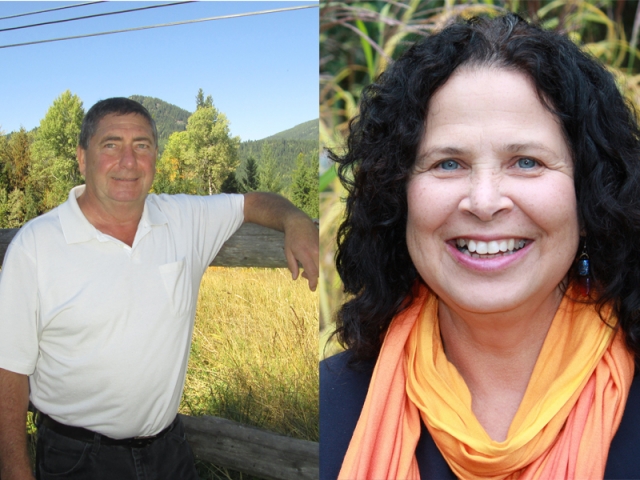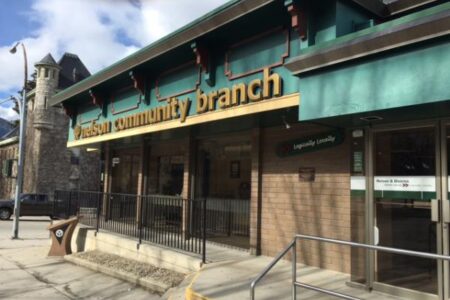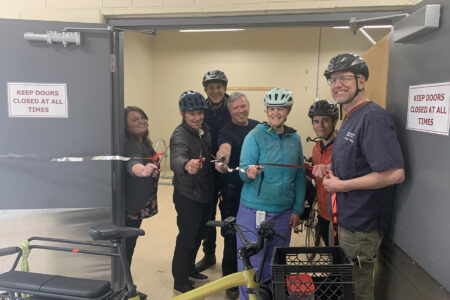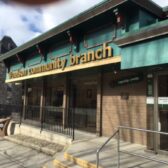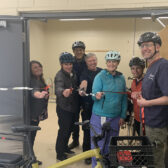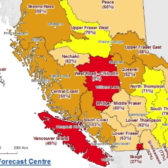Municipal Election 2014: Area E candidates discuss heavy bills, water and climate change
Two-term incumbent Ramona Faust and challenger Rick Marken square off in Area E elections Saturday, November 15 to see who will represent Blewett, Balfour, Harrop and Proctor around the board table of the Regional District of Central Kootenay.
Faust, who has lived in the area for the past 40 years, has worked in a management role for the past 16 years and now has a consulting business, focusing on grant writing and community development.
Along with husband Don, Faust is the proud grand parents of three boys and has a long history of volunteering for many projects in the social, business and environment sectors.
Challenger Marken, a Blewett resident, who is married with two sons, has lived in the area for several generations.
Marken runs a property management business, where he builds, purchases, renovates and re-sells homes.
Marken has also worked for the federal government in environmental management and habitat protection and served on the rec commission and Chamber of Commerce.
The Nelson Daily contacted both candidates with questions in Area E, Area F and Area D to help readers decide where to mark the “X” at the polling station Saturday, November 15.
Candidates in Area G — Hall Siding, Ymir, Ross Spur, Airport Road, Erie, Porto Rico, Nelway, Salmo North — decided not to participate.
The Nelson Daily: The regional district is going to have some upcoming heavy bills with the HB minesite remediation and the Nelson and District Aquatic Centre pool renovations. What other big ticket fixes can you foresee and how do you plan to pay for them without raising taxes?
Ramona Faust: I am not expecting any other large increases. As we add parks at the community’s request we may see a bit of an increase there. There are some issues of fairness that we continue to try to find an approach to in our relationship with the City of Nelson around the fact the City pays into rural parks but there are no city parks that rural areas pay into.
The NDCC has similar issues in that a wide geographic area uses the facility that Nelson, half of Area E and all of Area F pays into.
You are correct that the legacy of these two budget items have been a heavy weight on our taxpayers and we keep juggling to reduce the impact. You can only do that so long before you reach a tipping point.
The landfill at HB mine site will be decommissioned over the next few years once the provincial government accepts the RDCK remediation plan. I am hoping we will see a decrease in that budget item and an end to staff and director headaches.
We need assistance of other stakeholders in the site to reduce costs to the taxpayer in dealing with residual issues from before our ownership.
Waste removal and recycling are taxation intensive activities due to the geographic size of the area. We are always looking for a way to reduce and improve but capital investments in more efficient equipment needs to be balanced with funds taken up with the HB Mine site and physical improvements to our other physical sites at Marblehead, Kaslo, Balfour etc.
We were hoping to receive the legally required benefit of reducing or eliminating recycling costs however the provincially approved program run by Multi-Materials BC is not accepting new entrants and their requirements are so strenuous we continue to run our recycling program at the tax-payers expense when the packaging producers are supposed to be paying. We are pursuing all options to get Multi-materials BC to the table.
The NDCC budget will see an increase over a five-year borrowing term for the Aquatic Center repairs. We are trying to keep it to a minimum. Area E contributed $100,000 of Gas Tax Funds to the project and I am hoping Area F and the City may find funds to reduce taxation from an outside source.
Rick Markin: The RDCK does have some issues that may impose some large costs on the people of the RDCK, one of which originates from the decision to purchase the HB mine site.
We now have to deal with the consequences of contamination from the old mine tailing site. Negotiations with Tech and various government agencies to mitigate or negate the costs to the RDCK are on going, and if not, shall be.
The cost of the renovation of the Nelson and District Aquatic Center renovation seems to be a bit of a hot potato. The proposed 4.5 million in tax dollars being justified from a referendum held almost 10 years ago to build the original complex and pool upgrades, concerns me.
Lack of user input is still outstanding and out of town hiring is often an issue. I was involved as chair of the Recreation commission and sat on the building committee during the original construction of the Recreation Complex in the mid 2000’s.
This, $4.5 Million is over a third as much as we spent building the entire complex including the Aquatic center change rooms, water slide and leisure pool, and other aquatic upgrades. The urgency and the scope of the currently proposed renovations to Nelson and District Aquatic Center remain vague, however necessary, the renovations might be.
The Nelson Daily: Water quality is an issue for many RDCK residents on their own water systems. What are you prepared to do to help them remove boil water advisories or water quality advisories if elected?
Rick Markin: Water user groups are between a rock and a hard place, since the province imposed legislation (law) for water systems to be brought to Canadian drinking water standards. Unfortunately, funding by the province for the upgrades was not considered.
These volunteer systems have been functioning for many years and may test free from e coli or other contamination but most will fall under new laws imposed by the province and administered and enforced through IHA. The water licenses are under the authority of the Ministry of the Environment. Bringing these systems in line with the new laws is mandatory.
I will review water groups on an individual basis and assist with the financial burden within existing budgets. Having said that …I have every intention of persuing financial assistance from the responsible agencies such as IHA and MOE and the Provincial government. We need their assistance in funding these changes that they implemented and which is their mandate and is also their delegated responsibility to administer.
Ramona Faust: When I was elected I assisted the Balfour Improvement District to get off a long standing boil water advisory that was preventing economic growth in the area. These are old systems. The RDCK accepted the system into its water service and now is responsible for the disinfection regime required by Interior Health Authority.
Since that time the RDCK accepted the Grandview System and I have been talking with numerous water systems about their needs and when they are ready we will support them as well.. Recently Area E supported the Longbeach Water System but there are not unlimited funds and a lot of need. The RDCK through its trips to Union of BC Municipalities (UBCM) has led the province in trying to get reasonable water treatment requirements for small systems.
That’s the power of our advocacy efforts in meeting with Ministers and upper levels of government at UBCM.
The Nelson Daily: How do you think climate change will affect the residents in your area and what are you prepared to initiate during your four years of office to address it?
Ramona Faust: We invited CBT Adapting to Climate Change to the community. We identified it could affect wildfire risk, septic system function, water supply, road safety, food availability, commerce and increased hazards from landslides.
I am approaching it by working on wildfire risk, and sending information and an invitation to engage further to the community. I don’t think people see the potential affects because we are so self-sufficient. We have improved transit with more to do to get more cars off the road.
Currently I am working with a climate change consulting firm and we are working to reduce energy costs and Greenhouse Gas emissions in community buildings in Area E by working with the societies that own them. To be continued.
Rick Markin: Food security and forest fire threats are on our doorstep right now. Environmental consciousness to reduce emissions such as improved public transit and bicycle corridors will help, in a small way to reduce the threat globally and locally.
The threat of forest fires will increase and the Ministry of Forests and Lands must be encouraged to engage or support forest fire prevention, such as interface forest, fuel management and fire guards around populated areas. I recently viewed pictures of the drought in California and realized my advocacy for local food production is well founded.
We need to encourage and support as much food production locally as possible. It may become more than just nice to have local food, but necessary to have local food, sooner than we anticipated. Historically my family raised most of their own food in this area. I continue to grow a large vegetable garden and can, dry and freeze food for year round use. One uncle and aunt, of whom I am very proud, still farm our original homestead.
Sustainability and security for a resilient community.



